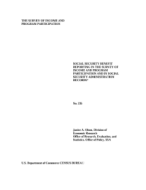Social Security Benefit Reporting in the Survey of Income and Program Participation and in Social Security Administration Records
Social Security Benefit Reporting in the Survey of Income and Program Participation and in Social Security Administration Records
The quality of Social Security benefit reporting is important to policy research on the Social Security program, and, more generally, to research on the economic well-being of the aged and disabled populations. This is particularly true for the aged among whom receipt of Social Security benefits is near universal, and reliance on such benefits is considerable. This paper examines the consistency between Social Security benefit amounts as reported in the Survey of Income and Program Participation (SIPP) and given in SSA administrative records. Results provide insights into data quality in the SIPP, point to some areas of concern, and lead to suggestions for further research.
A particular interest, especially for the aged, is whether or not the amounts reported in the SIPP include the amount of the Supplementary Medical Insurance (SMI) or Medicare Part B premium. (For those electing Part B coverage, except those with a Medicaid buy-in, the premium amount is withheld from the monthly benefit payment.) An earlier study, based on data from the Current Population Survey (CPS), showed that 40 percent of the aged in 1973 reported benefits net of the Medicare premium amount (Poehls, 1979).
The question takes on increased importance in light of current discussions surrounding recommended revisions in the official poverty measure, which were made by a National Academy of Sciences panel (Citro and Michael, 1995). One recommendation is to estimate poverty using the SIPP rather than the CPS, which is currently the official data source. Another recommendation would adjust available resources for medical out-of-pocket expenditures (MOOP), including Medicare premiums. As noted in Vaughan (draft, 2000), insofar as the Medicare premium is erroneously excluded from respondents’ benefit income reports but deducted from income as part of MOOP expenses under proposed new poverty measures, the Medicare premium would be effectively double counted. Misclassifications of poverty status could result, and because Medicare coverage is so widespread among the aged, there could be many such misclassifications.
Others in Series
Working Paper
Working Paper
Working Paper




